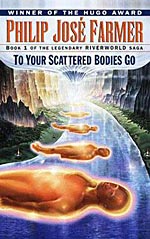
![]() bazhsw
bazhsw
10/20/2014
![]()
I really enjoyed this short novel. The basic premise is that everyone who has ever lived on Earth is resurrected naked alongside a long flowing River.
The story follows from the point of view of the 19th Century explorer Sir Richard Burton, himself who when alive attempted to find the source of the Nile (at least from a European point of view).
There is a sense of Babylon at first as it appears people not just from different parts of the world but different parts of history are together - there is some speaking in tongues to be sure.
It soon appears clear that the needs of resurrected humanity are catered for as each individual has a 'grail' attached to them which when placed in 'grailstones' (large mushroom structures with indentations) provide them with sustenance.
What's provided in the grails is very much a product of time - there's meat (but no vegan option), cigarettes, bourbon, marijuana and 'dreamgum'. Yep - that's what we need to survive, meat, fags, booze and drugs.
One of the saddest things about this novel and Farmer's view of humanity is that within a day or so humanity begins to screw and kill. Yes, in a world where our needs are taken care of we would choose to kill, build little empires and conquer others for slaves or mates. I choose to view humanity differently so the lack of cooperation and collaboration among many (most) of the River's inhabitants is a little dispiriting.
The treatment of women in the book is troubling. I have little problem with the fact that the central male characters are viewing potential sex partners and assessing the physical attributes of women. However Burton does verbalise some pretty sexist opinions (probably not viewed as sexist in the 1800's or 1970's) which reduces pretty much all the women into something to have sex with. The fact that pregnancy doesn't exist and women can be loosened up with stimulants seems a bit of a 'lads heaven'. Rape is a real threat for all the women but even the central characters could be considered committing borderline sexual assault.
That all said, it is very much a 'boy's own' adventure. Burton sails down the River, has a lot of interaction with Herman Goring and there is tons of violence and pursuit - a dramatic river battle being the peak. Real characters from history abound and this is the most fun aspect. It was interesting reading about the real characters and their stories in real life. Burton wrote a book that would be considered anti-Semitic and he is called out for this in the book. I like the idea of him being challenged in the 'afterlife' (by a character who is clearly loosely based on the author). However, there are certain comments made by other characters which are not challenged. Farmer's Jewish voices are problematic in that the racism towards Arabs is unchallenged.
The world building is fascinating and ripe for possibility (I think Farmer could have explored more ways of societal organisation other than exploitative / militaristic ones). The River is a character in it's own right. The novel is as much a spiritual journey as a physical one. It explores themes of regeneration and resurrection - how many times must one die and relive their life to achieve salvation. Is the journey down the River more a journey through one's soul?
As Burton begins to unlock some of the clues as to why they are there the novel does loose it's way somewhat but I'm certainly intrigued to read more.
Although modern audiences may baulk at some of the attitudes there is much to commend here - it raises questions as to what it is to be human, our views of religion and the afterlife. It also works as a great adventure story and mystery.